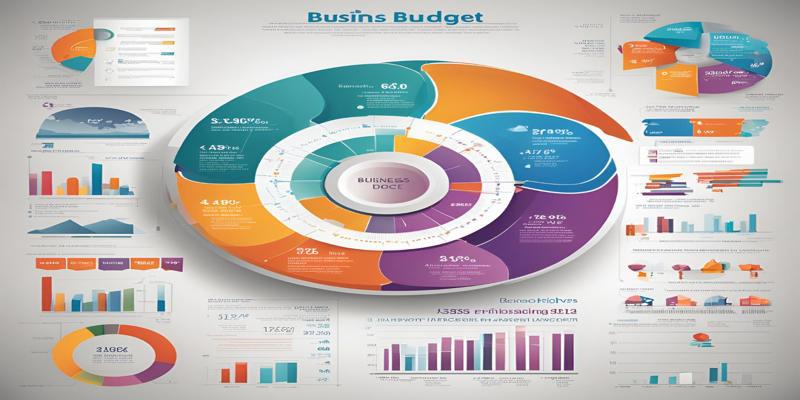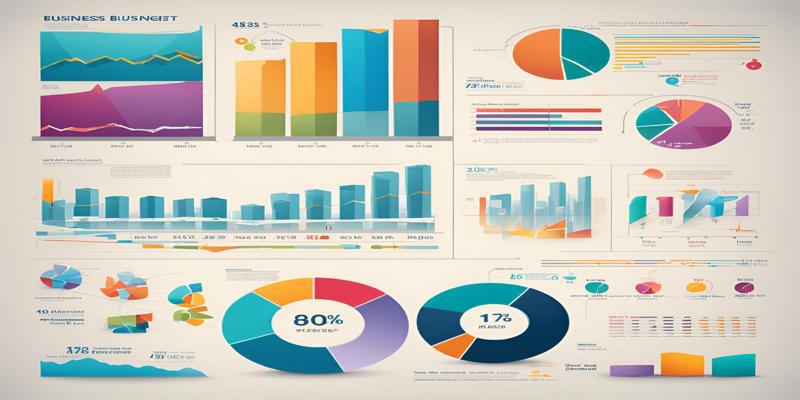How to budget effectively in uncertain times
Dec 02, 2024 By Susan Kelly
Creating a sound business budget has never been more critical in today's harsh economic environment. While sailing through unchartered waters, a well-prepared financial plan may be your compass to lead the company through turbulent times. Though uphill, the task is essential in creating a flexible budget considering all possible contingencies for stability and opportunities.
Why Budgeting is Crucial for Businesses During Uncertain Times

An elegant budget can differentiate survival and growth in a turbulent economy. Budgeting can be considered a market economic compass, helping companies navigate the uncharted waters and make well-informed decisions.
Financial Stability and Risk Management
A well-developed budget gives proprietors a sharp picture of a company's financial health before critical stages. They can plan for periods of low income with high expenditures. It eliminates the risk of economic decline or unexpected alterations in market direction.
Strategic Decision-Making
Budgeting triggers business entities to determine factors of importance regarding expenditures and how to maximize return on spending for long-term objectives. This becomes even more important in a turbulent job situation (a company may need to make some critical investment or cutback decisions). A well-structured budget empowers you with all the information you need to make decisions in a planned manner rather than in a reactive way.
Adaptability and Resilience
Budgeting in uncertain times is perhaps its most important featureit lends flexibility. Enterprises can quickly scale market changes through continuous review and adjustments for budgets. Such flexibility would allow companies to jump on unexpected opportunities or pivot if a situation arises. In this way, an agile budget practice transforms the uncertainty threat into a chance against the competition.
How to Forecast Revenue in an Unpredictable Economy
During uncertain times, a strategic approach is the most appropriate method of forecasting revenues. If you take these following steps, you will create more realistic projections and assume your business for these unwarranted fluctuations.
Analyze Historical Data and Trends
Begin by analyzing your firm's historical performance and paying close attention to patterns and trends. You can try to correlate economic leading and lagging indicators with the ups and downs in your revenues. This will help establish a historical framework to contextualize your business in light of current and future economic circumstances.
Utilize Multiple Forecasting Methods
Several methods of forecasting provide further context to your forecast. This might include:
- Bottom-up forecasting: Estimate revenue by individual product or service
- Top-down forecasting: Project overall market size and your expected market share
- Scenario planning: Develop best-case, worst-case, and most likely scenarios
Compare output from multiple methods to find areas of potential discrepancy to iterate projections.
Monitor Key Economic Indicators
Stay informed about critical economic leading and lagging indicators driving your business. These could include everything from GDP, inflation rate, and consumer confidence index to whatever other sectoral measurement applies. Every quarter or so, reassess your forecast for changes in those indicators to maintain its validity.
Cutting Costs Without Sacrificing Growth
In times of turbulence, each company should seek ways to reduce expenses without cutting growth. Of course, this is a tautological balancing act that demands serious strategy and deliberation.
Prioritize Essential Expenses
Split your expenses into "need-to-haves" and "nice-to-haves." You want to run the core of your business and customer-facing activities that directly affect revenue. You can temporarily suspend or cut non-essential expenses such as office perks or non-critical software subscriptions.
Optimize Operational Efficiency
Look for ways of streamlining processes and improving productivity. This can be:
- Automating repetitive tasks
- Renegotiating contracts with suppliers
- Implementing energy-saving measures
This naturally would mean that by being more efficient, you can sometimes save dollars without losing any output.
Invest in Strategic Growth Initiatives
While the axe is being struck into the budget, it's essential not to forget investments in long-term growth. Resources should be spent on high-value projects, market studies, and innovation. This will strategically help put your enterprise on the axis where things will shape up.
Embrace Flexible Work Arrangements
Consider offering telecommuting or flexible hours to increase savings in space, utilities, and other office-related expenditures. This will additionally give your employees more flexibility, which can help improve their satisfaction and productivity, benefiting your overall success.
Managing Cash Flow With Lean Budgeting

Lean Budgeting may be used to effectively manage a firm's cash flow during periods of uncertainty. It emphasizes flexibility and efficiency so that a firm can quickly change course as circumstances warrant.
Implementing Zero-Based Budgeting
It is a practical, impactful technique wherein each item must be justified from scratch. It does not work off last year's budget but starts on a clean slate. It effectively pushes you to look at every expenditure item to ensure that each dollar spent serves the business's current priorities and the market's correct state.
Prioritizing Essential Expenses
Clearly define your core business functions and prioritize resources accordingly. Focus on maintaining operations that drive revenue generation or customer retention. Be prepared to make hard choices regarding discretionary spending: can it be reduced, delayed, or eliminated?
Embracing Agile Financial Planning
In very dynamic environments, traditional annual budgets might not suffice. A firm could switch toward a rolling forecast model, whereby the budget is continuously updated regularly, possibly monthly or quarterly. This would enable the finance professional to react very fast to changes in the market by taking new information into account to reassess the financial strategy.
Adapting Your Budget Strategy to Changing Conditions
Flexibility in Budgeting is essential for a business's survival and growth during times of uncertainty. Adaptive techniques will help you better face these financial obstacles and seize unanticipated opportunities.
Implement Rolling Forecasts
In a world of rapid change, annual budgets can quickly become outdated. Consider moving to rolling forecasts refreshed quarterly or monthly. That way, you will revise financial plans based on current data and the newest market conditions, keeping your budget relevant and actionable.
Prioritize Scenario Planning
Identify various budget scenarios that change according to what might happen. Then, create best-case, worst-case, and most-likely scenarios and match each with an action plan. Proactive steps let you move quickly as fortunes shift and new risks are uncovered.
Embrace Agile Resource Allocation
Move away from strict and inflexible allocations and into a more fluid distribution of resources. Constantly revisit your spending priorities and be ready to reallocate funds across those areas that demonstrate the most significant promise or require immediate attention. Agility in this way will help you leverage emerging opportunities and address surprises quickly.
Conclusion
By integrating these adaptive strategies into the budgeting process, one is well set for times of uncertainty and long-term positioning of the business. However, in conclusion, living through these uncertain times, the development of a flexible and robust business budget considerably plays a vital role in the survival and success of any company.
On this page
Why Budgeting is Crucial for Businesses During Uncertain Times Financial Stability and Risk Management Strategic Decision-Making Adaptability and Resilience How to Forecast Revenue in an Unpredictable Economy Analyze Historical Data and Trends Utilize Multiple Forecasting Methods Monitor Key Economic Indicators Cutting Costs Without Sacrificing Growth Prioritize Essential Expenses Optimize Operational Efficiency Invest in Strategic Growth Initiatives Embrace Flexible Work Arrangements Managing Cash Flow With Lean Budgeting Implementing Zero-Based Budgeting Prioritizing Essential Expenses Embracing Agile Financial Planning Adapting Your Budget Strategy to Changing Conditions Implement Rolling Forecasts Prioritize Scenario Planning Embrace Agile Resource Allocation Conclusion
Nov 30, 2024
Investment
Thinly Traded Assets: What They Are and Why They Matter
Discover what "thinly traded" means, how it affects investments, and the risks involved. Learn why thinly traded assets can impact liquidity and decision-making in trading.

Dec 01, 2024
Banking
A 2024 Review of Teachers Federal Credit Union Personal Loans: What You Need to Know
Explore our comprehensive Teachers Federal Credit Union Personal Loan Review 2024. Learn about loan options, interest rates, and eligibility criteria to help you make an informed borrowing decision.

Feb 25, 2024
Know-how
How Do Etsy Discount Codes Generally Function?
In an Etsy store, promotional codes can offer discounts to customers before and after making a purchase. Creating discount codes is simple on Etsy, and they are a great way to encourage customers to purchase from your store. On Etsy, you can use promo codes to get a dollar amount off or a percentage off the final price of an item.

Sep 10, 2024
Investment
Navigating Tiny House Financing in 2024: What You Need to Know
The best tiny house financing options in 2024. This guide covers everything from loans to personal savings, making your tiny home dream a reality

May 11, 2024
Investment
7 Compound Interest Accounts to Grow Your Money
In this article, discover seven powerful compound interest accounts to help you steadily grow your wealth.

Dec 01, 2024
Investment
The Role of a Designated Market Maker (DMM) on the NYSE and Its Difference from a Broker
A Designated Market Maker (DMM) plays a vital role on the NYSE by maintaining stock liquidity and stability. Explore what a DMM does, how they differ from brokers, and their impact on trading.

Jan 23, 2024
Investment
Ways of Investments
The timing of when you sell investments might also affect your annual tax bill. It is necessary to pay capital gains taxes on any earnings from investments. If you sell an investment for less than you originally paid for it, you can use the amount by which the sale reduced your gain on your tax return

Nov 24, 2023
Taxes
Things You Need to Know About Tax Software
If you want the process of submitting your taxes to go as smoothly as possible, make sure that your tax forms are completed in the correct sequence, that you keep account of your spending during the year, and that you follow our other recommendations.

Nov 15, 2023
Taxes
Reasons for Additional Medicare Tax on Wages
The Additional Medicare Tax was first enacted into law in 2010 as a component of the Patient Protection and Affordable Care Act (ACA), and it was subsequently modified by the Health Care and Education Reconciliation Act not long after that.

Nov 30, 2024
Investment
Blotters in Finance: How They Work, Why They Matter, and Practical Applications
Learn what a blotter is, how it functions, and its uses in finance. From tracking trades to keeping accurate records, discover the essential role of blotters in financial and operational settings with examples for a clear understanding.

May 09, 2024
Investment
A Comprehensive Review of Bankers Life Insurance: What You Need to Know
Explore the benefits, potential drawbacks, and customer experiences of choosing Bankers Life Insurance, alongside comparisons with competitors.

Dec 02, 2024
Business
The Power of Personalization in Consumer and Business
Paradoxically, one of the most overlooked business strategies involves consolidating all your banking with one provider.